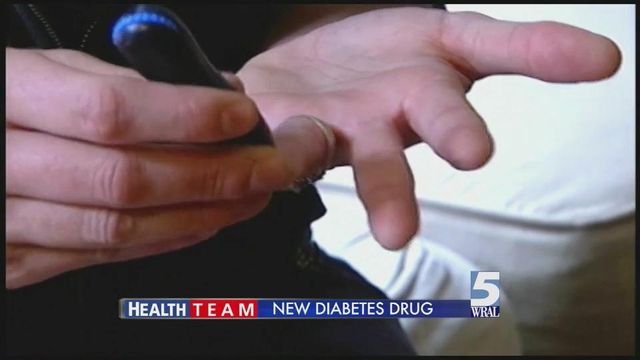New drugs, studies work to treat diabetes
Most patients with diabetes will need medication to control their blood sugar. The first line of treatment is typically a medication called Metformin. Eventually, most patients will need a second drug. There are several second-choice drugs, each with their own advantages and disadvantages.
Posted — UpdatedAlmost 30 million Americans have diabetes, but only about one third of them have good control of the disease.
Diet and exercise are the first step, but many people need medication.
Many diabetic patients have new-onset symptoms, such as frequent urination and excessive thirst, which are both hallmarks of the disease.
Diet and exercise are extremely important, but the majority of these patients also need additional medications.
Finding the right drugs to control blood sugar can be big challenge.
Most patients with diabetes will need medication to control their blood sugar. The first line of treatment is typically a medication called Metformin. Eventually, most patients will need a second drug.
There are several second-choice drugs, each with their own advantages and disadvantages.
"We don't have adequate head to head trials to prove that one is the clearly best way for the general population," said Dr. John Buse, director of the University of North Carolina diabetes unit.
Buse is leading a global research effort to find the best second drug choice to help control blood sugar levels and help normalize body weight.
He was part of a study published recently in the Journal of the American Medical Association that looked at adding insulin or another medication, which is also an injectable, called IDegLira.
"So, what we found was after six months of follow-up, that the patients on the IDegLira got to much better levels of overall blood sugar control, and they achieved those better levels with less hypoglycemia and weight loss instead of weight gain," Buse said.
The goal is to balance blood sugar, preventing extreme highs or lows.
"We really worry about the rare situation where we fix the blood sugar," Buse said, "but we create a serious problem with low blood sugar that frankly is a big threat to life."
Not only did the drug IDegLira improve control of blood sugar levels, it also resulted in some reduction in patients' systolic blood pressure.
Buse said the drug is under review by the FDA and could possibly become available in the United States later this year.
Experts are working hard to find a cure for diabetes, but until that is found, doctors are looking for medications that lower the blood sugar to a degree where complications such as blindness and amputations are minimized.
Buse pointed out that early in his practice he saw these complications, but they are much rarer now with new therapies.
This study arms doctors with better evidence as to how to better treat diabetic patients without the fear of dropping blood sugar too low.
Another study on the horizon is an intensive study called the "Grade" study, which is an international study involving thousands of patients that should help doctors better decide the best drugs to use to treat diabetes and in what order.
That study, though, does not end until 2022.
• Credits
Copyright 2024 by Capitol Broadcasting Company. All rights reserved. This material may not be published, broadcast, rewritten or redistributed.





